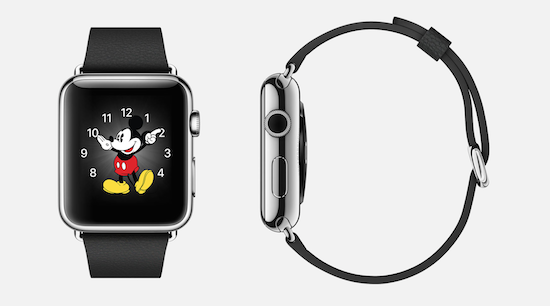The Apple iWatch is a thing of beauty and paves the way for their their move into the health and fitness market. But, says Alison, the use that Apple can make of the data it collects should be of great concern to the UK’s third sector.
I love a bit of self-tracking, and virtually every bit of kit I own features an apple with a chunk out of it. The new iWatch is my idea of tech joy and – especially since seeing the retro Mickey Mouse model – my heart is set on acquiring one. But I’m apprehensive, as well as excited, about the implications of this technology for those with long-term medical issues and it’s an issue I believe that those of us who work on digital solutions in health-related organisations in the third sector should be paying attention to.
A recent report by Deloitte stated that:
mHealth’s possibilities are virtually limitless: It may serve as a communication tool that shares real-time information and messages; a remote monitor that reduces isolation and brings care into the home; a smart device that monitors and reports real-time on patients’ health status; a videoconference channel wherein both parties can interact; or a companion that reminds and motivates its user to exercise or take their meds.1
To date, the mHealth revolution has been faced with major challenges – most notably the difficulty of getting different devices from different manufacturers to ‘speak to’ each other, and to integrate with healthcare provider systems.
Apple’s Health Kit goes a long way to resolving these issues. It allows data to be swapped between different systems so that, should you wish it, your weight can be sent directly from your wireless-enabled scales to Health Kit, where it can be read by My Fitness Pal, Nike Plus or any other compatible application.
This opens up a world of possibilities for people with conditions that benefit from monitoring and tracking. For example, people with type 1 diabetes who have digital testing kits will be able to wirelessly upload data to their preferred diabetes app. Apple has also done deals with major electronic healthcare record providers like Epic and EMIS, so as to enable the integration of health data into people’s medical records where it can be seen by GPs. As Forbes described it, Health Kit provides “a single comprehensive picture of your health situation”.2
In the US healthcare market, the implications are obvious. Data that tracks compliance to a health, fitness or medication regime can be collected and analysed, and used by health insurance companies to provide more personalised, targeted treatments. Apple is already working with some of the biggest medical and insurance companies.3
How this will play out in the UK market, where the NHS mainly manages health, remains to be seen. But we would be short-sighted, I think, to assume that this model will not cross the Atlantic and be used to help resolve the growing crisis in the NHS.
Our insurance industry already rewards ‘good behaviour’. If you sign up for the Prudential’s Vitality insurance, you can link your fitness tracker and earn ‘points’ every time you exercise. Drive Like A Girl monitors its customers’ driving with a digital tracker and adjusts their premium accordingly.
Such wellness incentives may seem fair. But making healthy choices isn’t always easy for people who have chronic conditions that prohibit exercise, who don’t have access to digital tracking technology, who live in unsafe neighbourhoods where going for a run isn’t an option, or who have long working hours or caregiving responsibilities. In this new climate, the more vulnerable, who may struggle to monitor or control their behavior, will suffer.
It is not only insurance companies who are interested in this data. Employers are another potential customer, and some are already exploring the use of fitness trackers to encourage their employees to live healthier lifestyles.
mHealth is set to be one of the next decade’s most significant digital growth areas, and the big players are all following Apple into the market. Google Fit gives third party developers a way of integrating their devices and utilizing sensors attached to Android Wear. Microsoft has announced Health Vault – a development platform, with cloud storage and links to multiple measurement and medical grade devices as well as their own Microsoft Band. Samsung has also launched a development platform and a wearable tacker called ‘SimBand’. The level of interest and investment from all the major tech companies suggests that they see big profits to be made from the data that this technology will provide.
Privacy and security are obviously major issues. One study found that consumers are particularly concerned about their confidential health information falling into the hands of their employers or others, with 45 percent somewhat or very concerned about the security of using mobile devices for health-related activities. 4 Apple is considering a “Health Kit Certification” for third party developers, stipulating how data must be stored and forbidding sale of data to advertisers5; but these issues are far from being worked out, and the voice of the customer is noticeably lacking.
The launch of the Apple iWatch marks the beginning of the mainstreaming of mHealth. For the third sector, mHealth offers huge opportunities to make positive, tailored, effective interventions. But it also has the potential to negatively impact the lives of those with chronic conditions or those least able to measure and manage their behaviour.
It’s something that patient organisations, healthcare associations and the sector at large has the opportunity to influence now at this early point in its development, but the window will not be there forever. The retro Mickey Mouse watch is ticking….
References:
1 mHealth in an mWorld – How mobile technology is transforming health care (Deloitte)
2 http://www.forbes.com/sites/dandiamond/2014/09/26/apples-healthkit-finally-arrives-after-bugs-botches-and-boatloads-of-apple-hype/
3 http://www.bloomberg.com/news/2014-08-21/wear-this-device-so-the-boss-knows-you-re-losing-weight.html
4 http://www2.deloitte.com/content/dam/Deloitte/us/Documents/life-sciences-health-care/us-lhsc-mhealth-in-an-mworld-103014.pdf
5 http://uk.reuters.com/article/2014/09/15/us-apple-health-idUSKBN0HA0Y720140915

